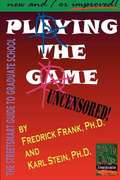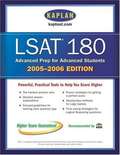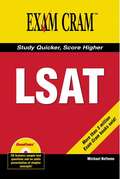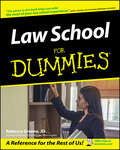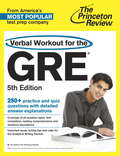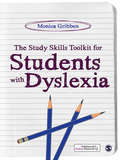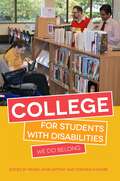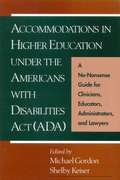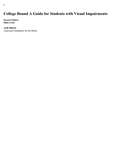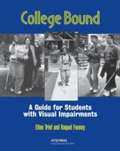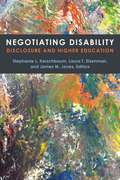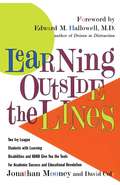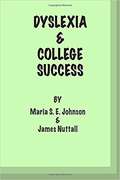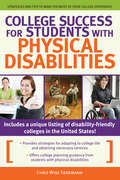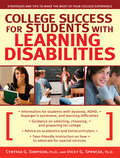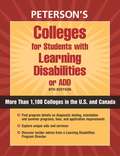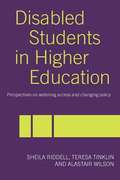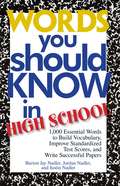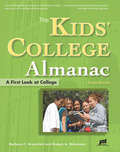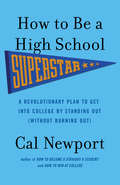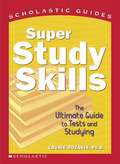Special Collections
Student Resources
- Table View
- List View
LSAT 180
by Eric GoodmanThe challenging practice and proven strategies you need to get a perfect score on the LSAT. This advanced guide includes: the toughest questions, the most effective logic games tactics, powerful reading comprehension strategies, top scoring logical reasoning techniques
Law School For Dummies
by Rebecca Fae GreeneThe straightforward guide to surviving and thriving in law school Every year more than 40,000 students enter law school and at any given moment there are over 125,000 law school students in the United States. Law school's highly pressurized, super-competitive atmosphere often leaves students stressed out and confused, especially in their first year. Balancing life and schoolwork, passing the bar, and landing a job are challenges that students often need help facing. In Law School For Dummies, former law school student Rebecca Fae Greene uses straight talk, sound advice, and gentle humor to help students sort through the swamp of coursework and focus on what's important-all while maintaining a life. She also offers rare insight on the law school experience for women, minorities, non-traditional, and non-Ivy League students.
Verbal Workout for the GRE, 5th Edition
by Princeton ReviewTHE PRINCETON REVIEW GETS RESULTS. The Princeton Review's Verbal Workout for the GRE gives you everything you need to practice your way to perfection on the verbal sections of the GRE exam. Inside, you'll find useful reviews of key test topics, strategies for tackling tough questions, and all the practice you need to get the score you want.This eBook edition has been optimized for digital viewing with cross-linked questions, answers, and explanations.Inside the Book: All the Practice & Strategies You Need · 250+ practice and quiz questions with detailed answers and explanations · Coverage of all question types: text completion, reading comprehension, and sentence equivalence· Important essay writing tips and rules for the Analytical Writing Section· Practice Issue and Argument essay prompts and sample essay responses · Dozens of important vocabulary words that you'll need to know for the Analytical Writing and Verbal sections of the GRE
The Study Skills Toolkit for Students with Dyslexia
by Monica Gribben'This toolkit is the student's safety net offering user friendly, down to earth advice and real life skills that have been tried and tested by the author'-Dr John Schneider, Educational Psychologist, Edinburgh 'This is exactly how I felt starting university ... a wonderful and very helpful book full of interesting and useful hints and tips on how to survive university as a dyslexic student. It doesn't make you feel silly or stupid but makes you feel you can achieve what you set out to do'-Sharon Patterson, Adult Nursing student, Edinburgh Napier University 'You realize you're in the hands of a professional who has taught thousands of students how to succeed at university'-Holly Pellicer, Dyslexia Advisor, University of Oslo Packed with helpful advice, checklists and templates, this book will help you improve your study skills throughout your time at university. Written in a straightforward, no- nonsense style, the guidance can be broken down into manageable chunks. Issues covered include: - procrastination - planning your assignment - understanding your essay question - researching, writing and referencing your written work - managing your own well-being. Drawing on years of experience running study skills workshops in higher education, Monica Gribben has written an accessible book for students with dyslexia that shows how to work through the challenges that studying presents. The companion Website www.sagepub.co.uk/gribben has podcasts, worksheets and electronic resources to support each chapter. Monica Gribben is a private dyslexia consultant and Dyslexia Adviser at Edinburgh Napier University.
College for Students with Disabilities
by Kerry Magro and Diana Damilatis and Pavan John Antony and Patrick Kelty and Melissa Mooney and Kelsey Mclaughlin and Sonia Minutella and Karleen Haines and Chanelle Tyler Best and Alyssa L. Conigliaro and Anita Frey and Francine Conway and Mitchell Nagler and Stephen M. Shore and Temple Grandin and Dena Gassner and Ehrin MchenrySharing the personal stories of individuals with disabilities who describe both the challenges and successes of their time in higher education, and with a major section on the findings of broad ranging research into the experiences of such students, the book explores the current situation, what works, and how things can be improved.
"You are not college material" or "you don't belong in college" are comments frequently heard by students with disabilities. Despite this, college education is now an expected part of the transition to adulthood for many individuals with disabilities. The book includes practical advice to encourage self-advocacy in students with disabilities, and to support the professionals who are facing the challenges alongside them.
Covering cerebral palsy, autism spectrum disorders, intellectual disabilities, and much more, this is vital reading for parents, individuals with disabilities, school teachers, college professors, and professionals working with adults with disabilities.
Accommodations in Higher Education under the Americans with Disabilities Act
by Michael Gordon and Shelby Keiser and Alta LapointThis manual outlines how the ADA applies to a wide range of mental and physical impairments within higher education settings, it outlines a series of fundamental principles and actual clinical/administrative procedure
College Bound
by Ellen TriefThe transition from high school to college is a significant turning point in a student's life, and this easy-to-read guide gives students the tools they need to select and apply to college and move forward with skill and confidence. Everything a student needs to know is included, from developing organizational, note-taking, test-taking, and study skills to managing living space, student-teacher relationships, social and academic life, and extracurricular and leisure time activities is included.
College Bound
by Ellen Trief and Raquel FeeneyThis book provides an essential reference source, serving as both a step-by-step guide for students to use independently and a much-needed text for educators to use to prepare students with visual impairments and blindness for success in college. It is organized into sections that can be read and worked on independently in whatever sequence best meets the student's needs. Appendixes contain charts that can be reproduced, resources for further information, and sources of products and materials.
Negotiating Disability
by Stephanie L Kerschbaum and Laura T Eisenman and James M JonesDisability is not always central to claims about diversity and inclusion in higher education, but should be. This collection reveals the pervasiveness of disability issues and considerations within many higher education populations and settings, from classrooms to physical environments to policy impacts on students, faculty, administrators, and staff. While disclosing one’s disability and identifying shared experiences can engender moments of solidarity, the situation is always complicated by the intersecting factors of race and ethnicity, gender, sexuality, and class. With disability disclosure as a central point of departure, this collection of essays builds on scholarship that highlights the deeply rhetorical nature of disclosure and embodied movement, emphasizing disability disclosure as a complex calculus in which degrees of perceptibility are dependent on contexts, types of interactions that are unfolding, interlocutors’ long- and short-term goals, disabilities, and disability experiences, and many other contingencies.
Students with Learning Disabilities at Graduate and Professional School
by Stanley J. AntonoffThis comprehensive text examines strategies to help students with learning and attentional disabilities get the most out of their graduate school experience.
Learning Outside the Lines
by Jonathan Mooney and David ColeEvery day, your school, your teachers, and even your peers draw lines to measure and standardize intelligence. They decide what criteria make one person smart and another person stupid. They decide who will succeed and who will just get by. Perhaps you find yourself outside the norm, because you learn differently -- but, unlike your classmates, you have no system in place that consistently supports your ability and desire to learn. Simply put, you are considered lazy and stupid. You are expected to fail. Learning Outside the Lines is written by two such "academic failures" -- that is, two academic failures who graduated from Brown University at the top of their class. Jonathan Mooney and David Cole teach you how to take control of your education and find true success -- and they offer all the reasons why you should persevere.
Dyslexia and College Success
by Maria S.E. Johnson and James NuttallWritten by two individuals with dyslexia and dysgraphia who have successfully navigated the college experience, it provides a unique first hand perspective on attending college with these limitations.
College Success for Students with Physical Disabilities
by Chris Wise TiedemannCollege Success for Students With Physical Disabilities is a college planning guide for students with physical disabilities and chronic medical conditions. Students will learn about their rights under the laws governing education and disability, self-advocacy, choosing a college, how having a physical disability affects admissions testing, the increased responsibilities in college, and how to make sure they get everything they need. The book contains forms, checklists, interviews with other students, advice from college disability services personnel, and profiles of disability-friendly colleges across the United States.
College Students with Learning Disabilities
by Susan A. VogelThis handbook answers such questions as: What is a learning disability? What technology might help a student with an LD? How can someone get through college with an LD? This book provides clear answers to questions which admissions officers often ask. It also includes several appendices listing resources which can help LD students do well in college and other higher education settings. Although teachers are not mentioned in the title, they may find this book to be a welcome resource, especially when mentoring highschool students.
College Success for Students with Learning Disabilities
by Cynthia G. Simpson and Vicky G. SpencerThe complete handbook for college-bound kids with learning disabilities. Planning for college can be one of the biggest moments in a teen's life, but for those students with learning and other disabilities, the college experience can be fraught with frustration, uncertainty, and lowered self-confidence. College Success for Students with Learning Disabilities offers teens the confidence, strategies, and guidance they need to effectively choose a college, get prepared for university life, and make the most of their collegiate experience. The book covers pertinent topics such as understanding the rights and responsibilities of students with special needs, talking to professors and peers, getting involved, asking for and receiving accommodations, and utilizing one's strengths to meet and exceed academic standards. This unique reference book also includes advice from current college students with disabilities to empower future students and provide them with hope for success.
Colleges for Students with Learning Disabilities and ADD
by Peterson'sExpanded and freshly updated, Colleges for Students with Learning Disabilities or ADD is a great resource for students searching for a college that will provide them with the programs they need. Although more than 700 colleges offer programs specifically for students with learning disabilities, few books offer detailed information about the services that these schools offer.
Disabled Students in Higher Education
by Sheila Riddell and Teresa Tinklin and Alastair WilsonThe authors present results gleaned from eight higher education institutions in Great Britain which demonstrate the level of participation by disabled students.
Reducing Barriers to Training of Blind Graduate Students in Psychology
by Heidi JoshiTo increase the number of psychologists with visual impairments, all levels of the pipeline, from graduate training through practica and internship, need to be accessible to this population. This study sought to determine the types of barriers students who are blind face in their psychology graduate programs. The areas explored in the study included accessing printed materials throughout participants graduate process, administering and scoring test protocols, accessing sources for research, and obtaining campus-wide communications. Attitudinal barriers were also explored in this study, particularly from supervisors, instructors, and peers. There is very little research in this area and as a result, this study was designed to elucidate the experiences of participants with visual impairments in their graduate programs. One goal was to give training institutions a better understanding of the barriers faced by students who are blind. Nineteen participants were interviewed using a semi-structured questionnaire consisting of yes/no and open-ended questions. Descriptive statistics were utilized in order to obtain the major themes of the responses. The most universal barrier related to the plethora of printed material encountered in graduate training. Nearly all of the participants discussed difficulties in obtaining printed material in alternate formats. They especially found it difficult to get enough sources in a timely manner for their research. Participants discussed missing class changes or other important details due to this information being posted in print and not accessible to them. Attitudes were a second barrier frequently encountered. Participants stated that they had to contend with the prejudicial attitudes of supervisors, professors, and peers who were meant to assist them in their process. Participants also discussed their wish to have more disability related awareness and education activities implemented in the curriculum of their graduate institutions. This would assist these institutions in overcoming the attitudinal barriers experienced by their students who were blind. However, participants also discussed supportive factors such as partners and professors who would provide appropriate classroom accommodations. Despite the over thirty years since passage of the rehabilitation act, and the fourteen years since the implementation of the American with Disabilities Act. Results indicate that numerous barriers still exist for graduate psychology students who are blind. These barriers must be aggressively addressed for persons who are blind to be afforded equal access to training in psychology.
Words You Should Know in High School
by Burton Jay Nadler and Jordan Nadler and Justin NadlerThis easy-to-use book features more than 1,000 essential words that arm you with the vocabulary you'll need to tackle real-world tasks-from debating current events to writing essays for your college applications.
The Kids' College Almanac
by Barbara C. Greenfield and Robert A. WeinsteinA fun and interesting way for middle school students to get their first information about college and how it's a possible and worthwhile goal to pursue. Starts with the basics and gives a comprehensive overview of everything the student can expect when exploring college--all in bite-sized pieces.
How to Be a High School Superstar (Without Burning Out)
by Cal NewportWhat if getting into your reach schools didn't require four years of excessive A. P. -taking, overwhelming activity schedules, and constant stress?
Junior School Essays
by Portrait AdvertisingAn essay is a piece of writing original in composition, which usually bring out the observations and recollections of the writer. This book contains 60 common essays, which will help students with ideas to develop their own creative compositions.
Super Study Skills
by Laurie RozakisFrom the Book jacket: Knowing how to study is important if you want to do your best in school. Super Study Skills: The Ultimate Guide to Tests and Studying has the helpful tips all students need to become more successful. Super Study Skills will show you how to * Study smarter to get the grades you want * Take tests with confidence * Get organized * Use your time more efficiently * Take great notes * Improve your reading comprehension * Reduce test jitters Plus Super Study Skills offers tips for taking specific kinds of tests, including true/false, essay, multiple choice, and more. Whether you are preparing for a standardized test, getting ready for a classroom quiz, or trying to improve your grades, Super Study Skills can help you reach your goals.
